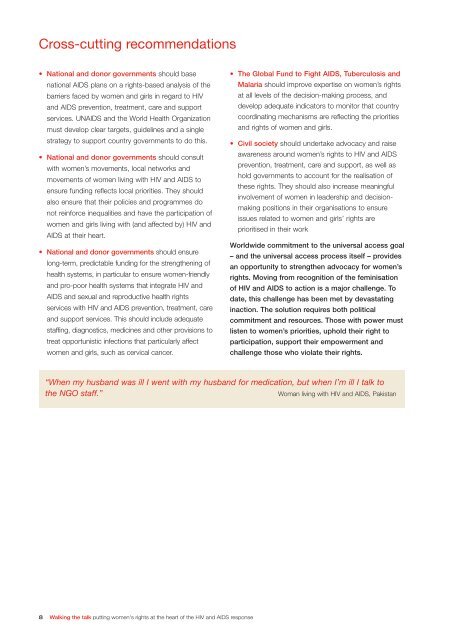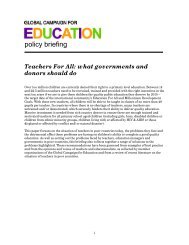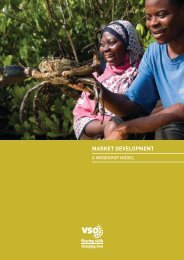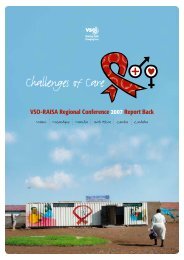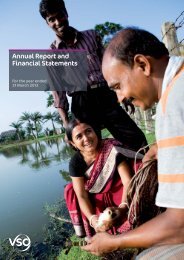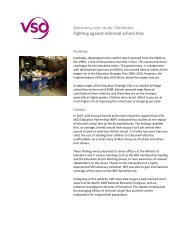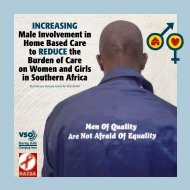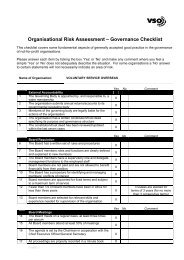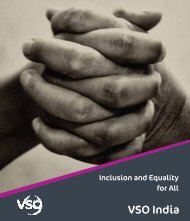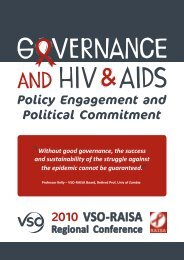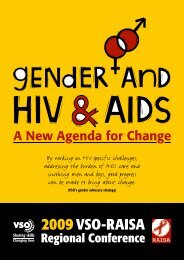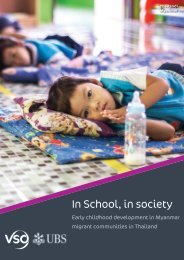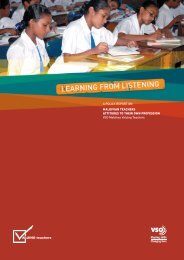Walking the Talk - VSO
Walking the Talk - VSO
Walking the Talk - VSO
You also want an ePaper? Increase the reach of your titles
YUMPU automatically turns print PDFs into web optimized ePapers that Google loves.
Cross-cutting recommendations• National and donor governments should basenational AIDS plans on a rights-based analysis of <strong>the</strong>barriers faced by women and girls in regard to HIVand AIDS prevention, treatment, care and supportservices. UNAIDS and <strong>the</strong> World Health Organizationmust develop clear targets, guidelines and a singlestrategy to support country governments to do this.• National and donor governments should consultwith women’s movements, local networks andmovements of women living with HIV and AIDS toensure funding reflects local priorities. They shouldalso ensure that <strong>the</strong>ir policies and programmes donot reinforce inequalities and have <strong>the</strong> participation ofwomen and girls living with (and affected by) HIV andAIDS at <strong>the</strong>ir heart.• National and donor governments should ensurelong-term, predictable funding for <strong>the</strong> streng<strong>the</strong>ning ofhealth systems, in particular to ensure women-friendlyand pro-poor health systems that integrate HIV andAIDS and sexual and reproductive health rightsservices with HIV and AIDS prevention, treatment, careand support services. This should include adequatestaffing, diagnostics, medicines and o<strong>the</strong>r provisions totreat opportunistic infections that particularly affectwomen and girls, such as cervical cancer.• The Global Fund to Fight AIDS, Tuberculosis andMalaria should improve expertise on women’s rightsat all levels of <strong>the</strong> decision-making process, anddevelop adequate indicators to monitor that countrycoordinating mechanisms are reflecting <strong>the</strong> prioritiesand rights of women and girls.• Civil society should undertake advocacy and raiseawareness around women’s rights to HIV and AIDSprevention, treatment, care and support, as well ashold governments to account for <strong>the</strong> realisation of<strong>the</strong>se rights. They should also increase meaningfulinvolvement of women in leadership and decisionmakingpositions in <strong>the</strong>ir organisations to ensureissues related to women and girls’ rights areprioritised in <strong>the</strong>ir workWorldwide commitment to <strong>the</strong> universal access goal– and <strong>the</strong> universal access process itself – providesan opportunity to streng<strong>the</strong>n advocacy for women’srights. Moving from recognition of <strong>the</strong> feminisationof HIV and AIDS to action is a major challenge. Todate, this challenge has been met by devastatinginaction. The solution requires both politicalcommitment and resources. Those with power mustlisten to women’s priorities, uphold <strong>the</strong>ir right toparticipation, support <strong>the</strong>ir empowerment andchallenge those who violate <strong>the</strong>ir rights.“When my husband was ill I went with my husband for medication, but when I’m ill I talk to<strong>the</strong> NGO staff.”Woman living with HIV and AIDS, Pakistan8 <strong>Walking</strong> <strong>the</strong> talk putting women's rights at <strong>the</strong> heart of <strong>the</strong> HIV and AIDS response


